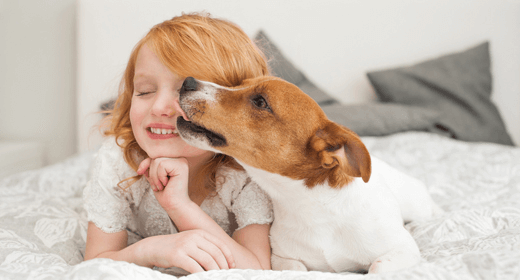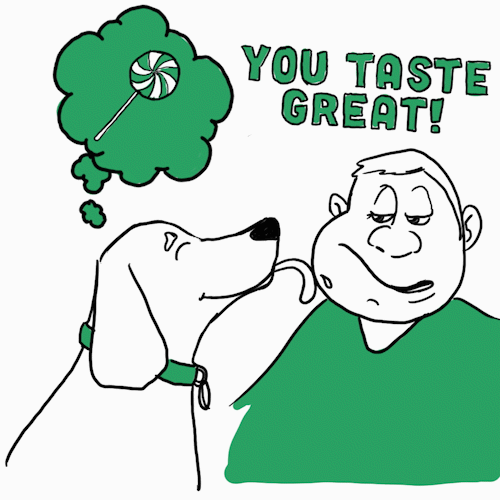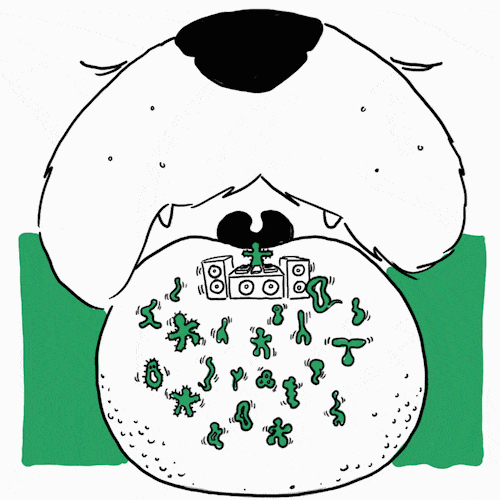

There’s no doubt that dogs are affectionate creatures. And they have numerous ways of showing it. One of these ways is by licking their owners. You may enjoy it when your furry friend comes up and gives you a big ol’ pooch smooch. But why do dogs lick you? In a poll* of dog owners, IAMS™ found a large majority (75%) believe dogs lick people to offer signs of friendliness. That’s definitely a correct assumption. Let’s dive a bit deeper for a better understanding.
Licking has been a social behaviour among dogs since the days of the great-great-great granddaddy wolf. 'It’s a standard canine greeting to lick others around the face,” agrees James Serpell, B.S., Ph.D., Professor of Humane Ethics & Animal Welfare at the University of Pennsylvania School of Veterinary Medicine. “Junior members of the pack will run around and lick the mouths of more senior members.” But is that all that there is to dog licking behaviour? Or are there more reasons why dogs lick people? Let’s find out!

Here are a few reasons that can explain why dogs like to lick.
For dogs, licking is equivalent to kissing or showing affection. You may have noticed female dogs licking their puppies which is a behaviour that is intended to show affection. And your dog considers you part of their pack, so they show you affection the same way their kind does - by licking.
Dogs are oral creatures and gather a lot of information about their surroundings through taste and smell. Maybe you’re salty after a sweaty run. Maybe you’ve got barbecue sauce on your face. “Dogs can smell a lot better than we can,” says Dr. Jo Gale, BVetMed CertLAS MRCVS, Senior Manager, Global Science Advocacy at Waltham Petcare Science Institute, “so they find a lot more things interesting to lick than we can.” This is despite the fact that dogs only have about 1,700 taste buds compared to around 9,000 in humans.
Have you been too busy with work lately? Or has anything kept you inattentive toward your pooch? If so, it’s probably one of the reasons why your dog is licking you. It is also possible that your dog just got too bored and wants you to play with them, which is why they’re suddenly licking you.
That’s true. Much like humans, dogs can also suffer from obsessive-compulsive disorder, which can be concerning. It is often triggered due to stress and anxiety and makes the dogs suddenly begin licking. You will need to visit your vet if you suspect this to be the case.

Unlike humans, no other animals have knowledge about or access to proper healthcare. So, when they get injured, their first instinct is to lick their wounds. This helps them numb the pain to a certain extent, and also clean the wound. Thus, when your dog sees a wound on you, their natural instincts kick in and they try to help you by licking the wound, thinking it will clean the wound and lower the pain.
In fact, in ancient Greece, dogs at the shrine of Asclepius were trained to lick patients. In the Middle Ages, Saint Roch was said to have been cured of a plague of sores through his dog’s licking. The French even have a saying, “langue de chien, langue de médecin,” which translates to, “a dog’s tongue, a doctor’s tongue.”
Don’t cancel your health insurance just yet. While a dog’s saliva does have some possible bactericidal properties against some types of bacteria, it can put you at risk of exposure to others. Too much licking can also reopen the wound and cause further infection. With modern medicine, you’re much better off hitting the first-aid kit. And that myth about dogs’ mouths being cleaner than humans’? Not true — both contain over 600 types of bacteria.
While an occasional canine kiss is “aww”-inducing, some dogs can overdo it to the point of annoyance. When this happens, the best thing to do is “completely ignore it and give no attention,” suggests Dr. Jo Gale. “When they stop, provide them with attention.” This acts as a form of positive reinforcement. Over time your dog will learn to scale back on the smooches. Another thing you can try is training them to cut back on the licking. Remember to use positive reinforcement in this case too - reward them with treats or toys when they display good behavior.
If you're looking for the perfect dog for you, try our Dog Breed Selector today and enjoy a lifetime of tail-wagging joy.
Yes, but not always. For dogs, licking is also a way to explore and understand the world and the beings around them. Sometimes it can also be an indication of their OCD.
Your dog may be licking you because of either of these reasons - to show affection, to seek your attention, because they like how you taste, or because they are feeling stressed or anxious.
If a dog keeps licking constantly, it may be because they are feeling anxious or stressed. Sometimes these feelings also trigger OCD in dogs, which can make them lick obsessively. They may also do it when they are bored and want your attention.
Sometimes, dogs choose to show dominance via licking. They may do this with either other dogs of the pack or with humans. Dog licking may indicate dominance especially when the licks are uninvited, and the dog begins showing dominant behaviour. This can include not obeying commands and acting in a demanding way.
A dog’s licking may indicate several things. They are either showing affection or are just bored and need your attention. They may also lick you if they think you taste good or interesting.


Just as in humans, gut health plays a pivotal role in a dog's overall health and well-being. But what exactly is gut health?
Essentially, it refers to the balance and functioning of the gastrointestinal (GI) tract, specifically the gut microbiome, a unique collection of thousands of different types of bacteria, viruses, fungi, and other microorganisms. This delicate ecosystem is crucial for almost every aspect of your dog's health, from nutrient absorption to cognitive functions.
However, our pet’s commercial diets, medications like antibiotics, and excessive indoor living can disrupt the balance of the gut microbiome, leading to canine digestion issues such as inflammatory bowel disease (IBD), immune system reactions, indigestion in dogs, and behavioral changes.
Fortunately, it's possible to restore and maintain your dog's gut health, while addressing signs of indigestion in dogs. Join us as we discuss the best ways to promote healthy dog digestion.
Improving your dog's gut health involves addressing any signs of digestive issues in dogs and working towards a well-balanced gut microbiome. Here are 4 of the best ways to improve your dog’s gut health, and in turn your dog’s digestion:
Introducing probiotics into your dog's diet can help build good bacteria and balance their microbiome. Probiotics increase immune resistance against harmful bacteria, fight intestinal infections, and provide nutritional support during digestive issues. You can try products like IAMS™ Proactive Health™ Digestive Health Supplement, which contains the probiotic Bacillus Subtilis. This helps degrade organic matter in the feces, reduce ammonia production and fecal odour, and promote the growth of good bacteria. To keep these beneficial probiotics thriving, consider adding soluble fibers into their meals, such as squash.
Regular exercise and playtime can significantly improve your dog's gut health. Exercise reduces stress, which can weaken its immune system and cause inflammation. Finding the right level of exercise for your dog's life stage and maintaining that routine can help manage canine digestion and overall health.
Feeding your dog a nutrient-dense, biologically appropriate diet can positively impact their gut health. Dogs require meat protein for optimal health, and raw meats rich in live enzymes can enhance digestibility and nutrient absorption. Including bone broth in their meals can also increase nutrient absorption and help restore the gut lining.
Just like humans, dogs can benefit from exposure to a variety of environments. This can help diversify their gut microbiome, leading to better digestion and overall health.
Indigestion in dogs is often a clear sign of poor gut health. Some other signs of digestive issues in dogs that you should watch out for are:
These signs could indicate a disrupted gut microbiome that needs attention. By taking steps to improve your dog's gut health, you'll be supporting their overall wellness and helping them lead a happier, healthier life.
If you notice signs of indigestion in dogs, such as diarrhoea, constipation, bloating, vomiting, or any changes in their behaviour, it’s crucial to consult with a vet. While occasional digestive issues can occur in dogs, persistent symptoms could indicate a disruption in their gut microbiome.
Investing in your dog's gut health through a comprehensive approach of diet, exercise, environment exposure, vet consultations, and supplements, can significantly improve their overall well-being. This will help to ensure healthy canine digestion, and a happier, healthier life for your furry friend.